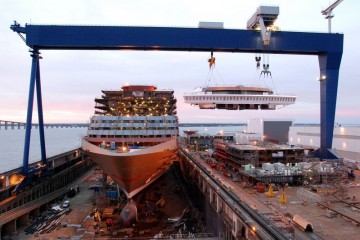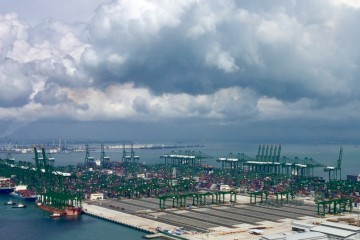Last week I wrote a piece in the Wall Street Journal on how consolidation in the container shipping sector – and the leap from four to three major alliances – would increase the already impressive grip of carriers on ports. I recommended that competition authorities take a look at this. Although many readers concurred with my assessment, there were also people that seemed to consider the pressure from carriers on ports of all times and actually quite normal. I think it is not only abnormal, but also dangerous for public finances.
On a sunny day in June 2014 I was in Antwerp to talk with the CEO of the port. This talk never happened, because that day the news broke that the Chinese blocked the proposed P3 alliance, a dramatic turn of events that asked for a response. Antwerp would have been one of the winners of the P3 alliance, as it was scheduled to get considerably more P3 calls than its main competitor Rotterdam; at the same time it would have become very dependent on what could basically be considered one client. So, the demise of P3 could be seen as a source of sadness and relief at the same time. The story continued well for Antwerp; it managed to attract many calls of the new alliances and grew with 7.5 % in 2015, much better than Rotterdam that declined with 0.5% in the same year – and at the detriment of the port of Zeebrugge that lost 25% of its containerised cargo volumes in 2015. What this episode illustrates is the power that alliances have over ports; their decisions can lead to big cargo losses for ports that are otherwise perfectly competitive.
With this power, container lines can pressure ports for more favourable conditions: cheaper tariffs or better services. There are the official port tariffs and then there is reality. Most ports give rebates for big customers – and the biggest customers have most leeway to negotiate – to push – for better tariffs. A gratifying assignment awaits ambitious investigative journalists: unravel the practices of carriers to reduce rates – and what is the result of this: that the smaller guys pay more than the big ones, that less flexible cargo types cross-subsidise the container sector. A curious outcome: no incentives for loyalty, but rewards for a competitive race to the bottom, in which many costs are off-loaded to the public sector.
There are plenty examples of this around. I recently heard about a very large container line requesting a very large North East Asian port that its access channel be deepened to 18 metres. The port will do it, financed with public money: it has no choice if it would like to keep the line as a customer. So even the mega-ports are often powerless against mega-carriers; so imagine the power that carriers can exert vis-à-vis mid-sized ports that are really dependent on just one carrier or alliance.
And by the way, this is not only restricted to ports. A few months ago, the Suez Canal authority felt obliged to lower its tariffs when various container lines snubbed the Canal in favour of the longer sea route around the Cape – helped by historically low oil prices. This was just months after the Canal authority had inaugurated the canal extension basically to accommodate for larger ship size, bombastically dubbed “Egypt’s gift to the world”. See here the typical carrier behaviour in action: they first pressure for public investments to adapt infrastructure to their requirements, and then find ways to pressure for lowering the rates so that they do not have to pay for the investments. Rather than a gift to the world or world trade, we observe manifold “gifts to container lines”. What happened to Egypt sadly enough happens to many countries around the world: underused expensive pieces of infrastructure paid with taxpayers’ money.
There is a serious threat that this will get even worse if the sector gets more concentrated. We are currently in a wave of new consolidations and alliances. Competition authorities will soon have to decide on whether they approve these new alliances and the recently proposed mergers between container lines. We can only hope that they take the consequences of carrier concentration on ports into account. If they do, they will deserve taxpayers’ gratitude.



